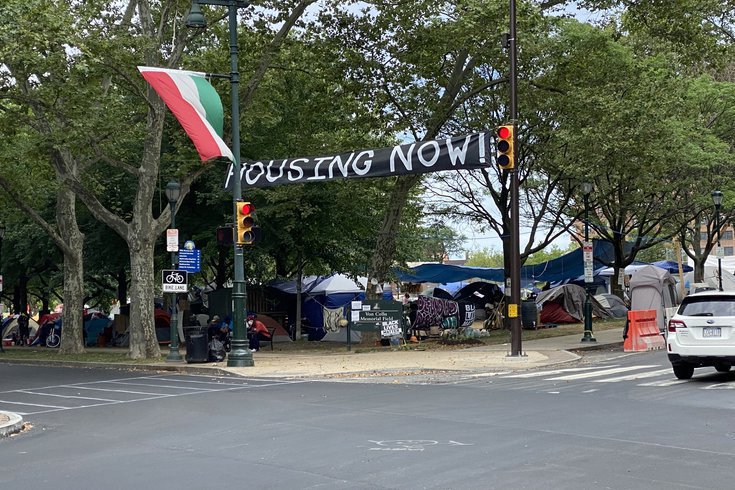
October 06, 2020
 HughE Dillon/For PhillyVoice
HughE Dillon/For PhillyVoice
Camp Teddy residents will now be able to opt-in to social services from a non-profit organization called Project HOME and the city itself in order to gain affordable housing. Above, a picture of the protest encampment located at 22nd St. and the Ben Franklin Parkway.
The homeless encampment at Ridge Ave. has disbanded after the Philadelphia Housing Authority and OccupyPHA came to an agreement to end “Camp Teddy” after months of negotiations.
Residents of the homeless encampment, located across the street from the PHA’s headquarters, voluntarily left on Monday, city officials said.
“I want to thank all of those whose hard work and good faith negotiating resulted in this resolution,” Mayor Jim Kenney said. “As I have said from the start, the issues raised by the camp leaders — homelessness and the lack of affordable housing — are deep rooted and urgent. We hope this agreement will lead to a resolution of the separate protest camp on the Parkway. And we hope it will lead to new impetus among all partners to solve these vexing problems.”
Camp Teddy residents will now be able to opt-in to social services from a non-profit organization called Project HOME and the city itself in order to gain affordable housing.
Alongside the Building and Construction Trades Council, the PHA will create a pilot initiative called “Working for Home Repair Training Program.” This will create housing and job opportunities for those experiencing homelessness through the renovation of long-term vacant homes, some of which have been unoccupied for over 20 years.
The PHA will also seek to establish a homeless relief program at its board meeting next Thursday. If approved, the PHA will allocate 25 permanent housing opportunities for homeless families who are referred to the organization.
The housing opportunities can be for public housing units or Housing Choice Voucher programs. The PHA will execute a memorandum of understanding with a service provider, and this option will be available through the end of the year.
“In late June, OccupyPHA along with residents of the Parkway Encampment (known as Camp JTD) moved to parcels of land located across from PHA's Headquarters with the goal of pressuring PHA to come to the table regarding the housing crisis in Philadelphia and to discuss uses for long term vacant PHA properties,” OccupyPHA Founder Jennifer Bennetch said.
“At times it seemed like all of our efforts would be in vain, however we were able to reach an agreement with PHA to create a Community Land Trust for permanent low income housing with long term vacant PHA properties that were going to be disposed of. We appreciate PHA’s willingness to explore this idea with us, we look forward to our new venture and hope that it leads to lasting change.”
The end of the homeless encampment on Ridge Ave. will now allow for the construction of a new supermarket, as well as 98 units of housing, a bank, an urgent care center, and other retail businesses, to move forward, city officials said. The $52 million development project will take place in the Sharswood neighborhood.
“I would like to thank Ms. Bennetch and the other encampment leaders for highlighting the urgent need for long-term permanent housing and the need for more resources to address homelessness,” PHA President and CEO Kelvin Jeremiah said. “I have always said that there is an affordable housing crisis in Philadelphia and that PHA is willing to do its part to help solve this problem, but we cannot do it alone. There needs to be true collaboration of resources and ideas to meaningfully address this problem.”
Philadelphia Housing Action officials announced at the end of last month that a tentative deal had been reached to provide protest camp residents with 50 vacant homes as part of a community land trust established by the organization. 50 mothers and children experiencing homelessness would be permitted to stay in 15 vacant city-owned houses.
The two homeless protest encampments, located at Ridge Ave. and 22nd and the Ben Franklin Parkway, would remain in place while residents transitioned into the vacant homes and others explored alternative housing options.
The land trust would designate these properties for use as low-income housing, defined as $25,000 and below, and they would be controlled by local committees.
The city and the Philadelphia Housing Authority would transfer properties that are available to the community land trust, which would allow for families to remain in the unavailable properties until the land trust can accommodate them elsewhere.
The houses being transferred would be slated for auction or sale and would not be removed from low-income housing availability or move people ahead of the Philadelphia Housing Authority's waiting list.
The community land trust would fill a significant gap in the low-income housing space by helping out those who might not be able to access other housing options due to criminal records or evictions histories.
City officials, however, had said that more details need to be worked out to end the homeless encampments.
Follow Pat & PhillyVoice on Twitter: @Pat_Ralph | @thePhillyVoice
Like us on Facebook: PhillyVoice
Add Pat's RSS feed to your feed reader
Have a news tip? Let us know.